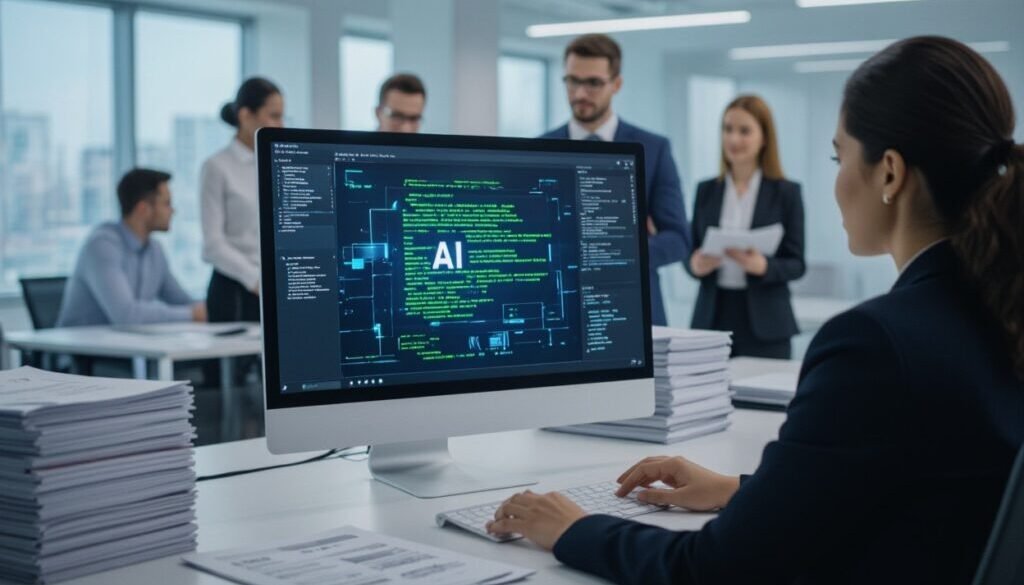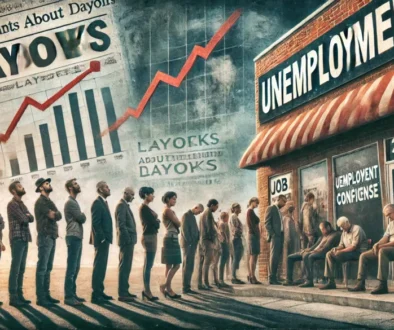AI job recruiters used by top companies despite glitches
Many of you might have encountered AI recruiters during your job search, as major companies increasingly rely on these digital assistants to streamline hiring. While these AI agents help speed up initial screenings and interviews, glitches and unexpected behaviors have sparked both curiosity and concern. At Your Career Place, we understand how this technology impacts your experience and want to give you a clear view of how AI recruiters work, their benefits, and the challenges you might face when navigating AI-driven hiring processes.

Key Takeaways:
- AI recruiting agents are increasingly popular among big companies like McDonald’s, Club Pilates, and the Boston Red Sox, helping speed up the hiring process by handling tasks like screening and scheduling interviews. At Your Career Place, we see how this technology is changing the way job seekers experience recruitment.
- Despite their benefits, these AI agents sometimes glitch during interviews, leading to awkward moments or confusion. For example, candidates have shared viral videos of AI recruiters repeating strange phrases or freezing up, highlighting that this tech isn’t always perfect.
- Transparency is still catching up—some companies don’t clearly inform candidates when an AI will be part of their interview, or give an option to opt out. At Your Career Place, we always encourage job seekers to ask questions and stay aware of how AI tools might be used in their hiring journey.
The Allure of AI in Recruitment
You’ve likely noticed how AI is reshaping recruitment by promising faster, more streamlined hiring processes. Companies are eager to adopt these technologies because they can handle thousands of applications simultaneously, while giving candidates instant responses. While glitches and unanswered follow-ups make headlines, the appeal lies in efficiency and scale—benefits that can’t be ignored in competitive job markets. At Your Career Place, we see how AI tools aim to balance speed with candidate engagement, even as the technology is still ironing out its imperfections.
Efficiency and Cost Savings
AI-powered recruiting agents reduce the need for large HR teams by automating repetitive tasks like screening resumes, scheduling interviews, and answering FAQs. For example, McDonald’s cut its average hiring time from 21 days to under three using AI assistance, which means fewer resources spent on administration and more focus on strategic hiring. For your organization, this translates into lower costs and a quicker turnaround in finding the right talent without burning out your HR staff.
Access to a Broader Talent Pool
AI recruiters operate 24/7, engaging with candidates outside regular business hours and across different time zones, increasing your reach far beyond traditional limitations. Fontainebleau Las Vegas, for instance, found that 41% of conversations with their AI assistant happened overnight, allowing them to interact with a wider and more diverse audience who might otherwise miss out on timely communication.
This around-the-clock accessibility means you can tap into talent pools in regions or demographics that are typically harder to reach, including those balancing jobs, education, or caregiving responsibilities. AI can also help reduce initial human biases by focusing on skills and experience, opening doors for candidates you might not have considered through conventional screening. Your Career Place encourages leveraging this advantage thoughtfully, combining AI’s scale with human insight to bring diversity and fresh perspectives into your hiring.

Glitches and Pitfalls: The Dark Side of AI Recruiters
Even as AI recruiting agents streamline hiring, glitches throw real candidates like you into frustrating situations. From robotic repetitions to unexplained interview cutoffs, these AI hiccups can leave you confused and forgotten, just as Wafa Shafiq and Kendiana Colin experienced. Your responses may never get human attention, and lack of transparency around AI use only deepens that disconnect. At Your Career Place, we understand that while efficiency counts, these growing pains show why a human touch remains vital in recruitment.
Misinterpretation of Qualifications
AI recruiters sometimes stumble interpreting your resume details or responses. These systems might misread nuanced skills or fail to recognize relevant experience if phrased outside programmed keywords, potentially excluding qualified candidates early. For example, one applicant was mistakenly flagged due to an AI glitch, losing an opportunity despite fitting the role perfectly. You want your unique qualifications understood—not overlooked because of rigid algorithms.
Bias in Automated Screening
Removing human bias doesn’t guarantee fairness; AI recruiting tools can inherit or even amplify new biases hidden in their training data. These automated systems risk unfairly filtering candidates based on gender, ethnicity, or education background if those patterns exist in past hiring records. You might find your application sidelined not by who you are but by hidden algorithmic prejudices skewing decisions.
Bias in AI stems largely from the data these tools learn from. If historical hiring favored certain demographics or traits, AI models trained on this data replicate those patterns, embedding systemic bias into your screening process. For instance, AI systems have been shown to unintentionally downgrade resumes with non-traditional education or from underrepresented groups, freezing diversity efforts. At Your Career Place, we stress the importance of continuous auditing and evolving AI recruitment practices to catch and correct these biases, ensuring the technology serves all applicants equitably.
Real-World Impacts: How Companies Navigate AI Challenges
Companies deploying AI recruiting tools balance the efficiency AI brings with the risks of glitches and impersonal experiences. Your Career Place sees firsthand how personalization falters when AI misfires or when candidates are left in the dark, like Shafiq and Colin’s stories show. In response, many employers combine AI with human judgment and clear communication to retain candidate trust, especially amid increasing scrutiny on transparency and data security. You want to be aware of how these real-world trade-offs might affect your job search or hiring process as AI becomes more entrenched in recruitment.
Integrating Human Oversight
AI works best when paired with human oversight, ensuring candidates aren’t trapped in frustrating loops or left unanswered. Your Career Place encourages organizations to include recruiters who can step in quickly when AI glitches or when complex questions arise. Fontainebleau Las Vegas’s use of “Morris” includes clear disclosure and a handoff to human managers for deeper engagement, helping maintain candidate confidence without sacrificing speed.
Case Examples of Success and Failure
Some companies like McDonald’s cut hiring time from 21 days to under three using AI, showing clear efficiency gains. Meanwhile, incidents like the glitchy “vertical bar Pilates” interview or Paradox’s brief security hiccup illustrate AI’s fallibility. Your Career Place notes these examples highlight how AI is a powerful tool but still imperfect and dependent on proper management.
For instance, McDonald’s partnership with Paradox’s AI “Olivia” streamlined scheduling and candidate communication, significantly reducing costs and speeding up hiring. Conversely, viral moments such as Kendiana Colin’s repetitive AI interview experience reveal how technical bugs can erode candidate trust. Even with swift fixes, companies often struggle with transparency—your Career Place stays attentive to how these successes and failures inform better AI integration and candidate experience.
The Future of AI Recruiting: Trends and Innovations
AI recruiting technology is evolving rapidly, with more companies embracing it to streamline candidate screening and improve hiring efficiency. You’ll see smarter AI tools capable of more natural conversations and better understanding of nuanced responses. Integration with existing HR platforms will become seamless, helping recruiters focus on high-value tasks while AI handles repetitive interactions. At Your Career Place, we’re keeping a close eye on these advancements to help you navigate this shifting landscape with confidence.
Enhancements on the Horizon
AI recruiting agents are advancing beyond scripted interviews to enable real-time sentiment analysis and adaptive questioning based on your responses. Improvements in natural language processing will allow AI to pick up on tone and context, making interactions feel less robotic. You’ll also notice better transparency features, like upfront disclosures about AI involvement and easier ways to request accommodations, a nod toward more candidate-centric recruiting experiences.
The Role of Ethics in AI Development
Ethical considerations are becoming a significant focus as AI recruitment tools grow more widespread. You deserve clear communication about how AI evaluates you, including explanations about data use and decision-making criteria. Fairness goes beyond removing human bias—it requires actively preventing new algorithmic biases from creeping in. Companies like Your Career Place support efforts pushing for stronger regulations and ethical standards that protect your rights throughout the hiring process.
Beyond transparency, ethical AI development demands rigorous testing to identify biases linked to gender, race, or disability that could unfairly affect your chances. Developers are increasingly involving diverse experts to audit AI systems and create guardrails ensuring equity. Meanwhile, privacy protections are under scrutiny—following incidents like the McDonald’s hiring platform vulnerability—to prevent your personal information from being exposed. The move towards responsible AI means you should be able to trust not only the technology but also the companies deploying it.
Adaptation Strategies for Job Seekers
You can’t control every glitch, but mastering how to navigate AI interview systems can give you an edge. Preparing for interactions with AI recruiters means anticipating the unexpected—whether it’s video interviews with agents like Apriora’s Alex or text-based bots like Paradox’s Olivia. Staying informed about which companies use AI tools and understanding how these systems evaluate candidates help you tailor your approach effectively. At Your Career Place, we’ve seen that blending human insight with digital savvy boosts your chances in this rapidly evolving job market.
Techniques for Standing Out
Given AI’s reliance on keywords and structured responses, honing clarity and precision in your answers matters. You can highlight specific achievements using metrics—for example, “increased social media engagement by 40%”—to make your profile pop. Video interviews with AI often analyze tone and pace, so practicing concise yet engaging replies is a smart move. Adding a personal story or unique skill relevant to the role could help tilt the scales in your favor, even when a non-human interviewer steers the conversation.
Navigating AI Screening Processes
AI recruiters scan applications and conversations quickly, prioritizing relevant experience and keywords. You’ll want to customize your resume and responses based on the job description, incorporating terms the AI algorithms recognize. If the system offers real-time transcripts or feedback, use those cues to adjust your answers on the spot. When given a chance, opt for human review or clarification to balance AI’s limitations. At Your Career Place, we guide candidates to spot these opportunities and craft their narratives for both machines and humans.
Beyond keyword optimization, understanding AI behaviors helps you manage interviews more confidently. Some platforms allow you to request accommodations or opt out of AI interviewing altogether, so check company policies beforehand. Familiarize yourself with common AI quirks—like repeated questions or misinterpretations—and prepare calm, clear responses to re-center the dialogue. Tracking your interactions through recordings or notes can also provide valuable insights for improving future interviews. The more you engage proactively with AI systems, the better you shape your own hiring experience.
Conclusion
The use of AI job recruiters by top companies is becoming a common practice, even with occasional glitches and concerns about transparency. As you navigate your job search, it’s important to be prepared for interactions with AI agents like those discussed here. At Your Career Place, we want you to understand that while these technologies aim to streamline hiring, they may sometimes feel impersonal or unpredictable. Staying informed and adaptable can help you make the most of these evolving tools and keep your job hunt moving forward efficiently.
Thank you for visiting Your Career Place. Please review these similar articles.
https://yourcareerplace.com/ai-key-to-solving-hiring-challenges/
https://yourcareerplace.com/best-ways-to-make-money-with-ai/




